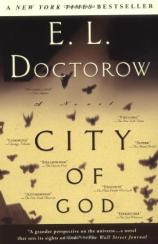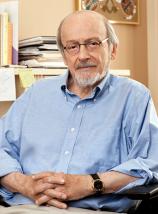Reading Group Guide
Discussion Questions
City of God

1. One critic has written that City of God is a story about storytelling—about the ubiquity of narrative; about the whole of language existing as a storytelling tool to reflect and respond to reality; about consciousness perceived as a narrative (hi)story. Do you agree with this characterization? Discuss the dozens of stories that comprise Doctorow's book, from the story of the universe to Yehoshua's ghetto narrative, highlighting the interplay that exists among them.
2. Discuss the structure, language, and imagery of City of God. In what ways does it mimic or recreate the rhythms of contemporary thought and life? How might Doctorow's structure—full as it is of spiraling ideas, images, and themes which recur and continually double back on themselves—be viewed as a sort of jazz-like innovation on the Wagnerian leitmotif? To what end do these spiraling repetitions of theme progress? How do they all relate to and riff upon the central mystery of the missing cross?
3. When Pem goes to the cancer ward just after leaving the priesthood, he encounters a group of dying people singing twentieth-century standards. Discuss the implications of this scene. Why does it affect Pem the way it does? What does it mean when the pop song, that most "self-referential" and instantly recognizable of all musical genres, is transformed into a sort of secular hymnal?
4. Compare and contrast the spiritual and metaphysical quests of Pem, Everett, and Sarah.
5. Chart the course of Pem's relationship with Sarah Blumenthal, from their first meeting at the synagogue where the stolen cross is discovered, to their wedding reception at the close of the book. What qualities attract Pem to Sarah? Sarah to Pem? And in terms of the book's major themes, what are the implications of their union? How does their marriage affect Everett? What is it about these two ecclesiastics that Everett finds so fascinating?
6. "You say all history has contrived to pour this beer into my glass," says the nameless Vietnam veteran to Everett. Later, Pem speaks of "a great historically amassed communal creation." And finally, much earlier in the novel, Rabbi Joshua asks, "Is time a loop? Do you have the same feeling I have—that everything seems to be running backwards? That civilization is in reverse?" What is going on in all of these lines? What theme is Doctorow underscoring here?
7. How might the Jewish notion of Messianic time, in which all of history becomes meaningful retrospectively by the sudden and unexpected coming of the Messiah, be linked to the themes in City of God?
8. City of God is one of those perfect books for reading clubs and discussions among friends, because much of the power in this novel derives from what the author leaves unsaid, from what lies in the spaces between the characters' perceptions, and from the ways Doctorow invites the reader to draw her/his own conclusions and make her/his own conjectures. Discuss your reactions to Doctorow's characters and their relationships to each other. What techniques does the author use to develop the novel's central characters? What particular qualities make these people so believable and/or affecting?
9. Discuss the book's extended portrait of the man who discovers that his life is gradually becoming a movie. What is going on here? Fill in the blanks of Doctorow's metaphor.
10. Pem ferociously struggles with the Judeo-Christian tradition—in much the way his real-life forebear, James Pike, did—because it appears to him to be more a narrative about power, genocidal destruction, and the renunciation of human reason and intellect than about faith, hope, and love. "I take the position that true faith is not a supersessional knowledge. It cannot discard the intellect. . . . How can we presume to exalt our religious vision over the ordinary pursuits of our rational minds?" Interpret Pem's remarks here to the bishop's examiners. Then re-read Pem's crowning toast at the wedding, the culmination of his struggle. How does this impassioned and captivating speech serve to bring together the myriad fragments that have preceded it in City of God?
City of God
- Publication Date: February 1, 2001
- Paperback: 288 pages
- Publisher: Plume
- ISBN-10: 0452282098
- ISBN-13: 9780452282094








